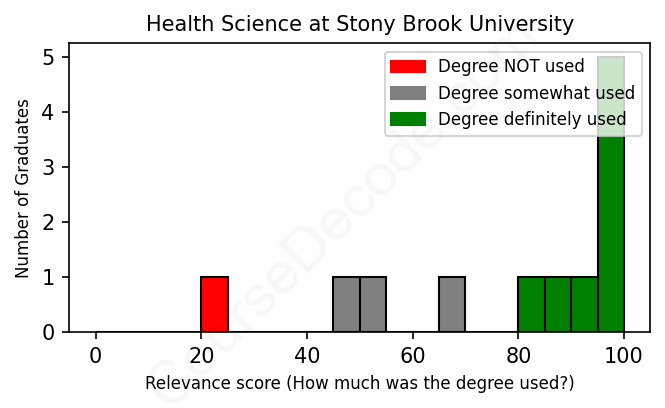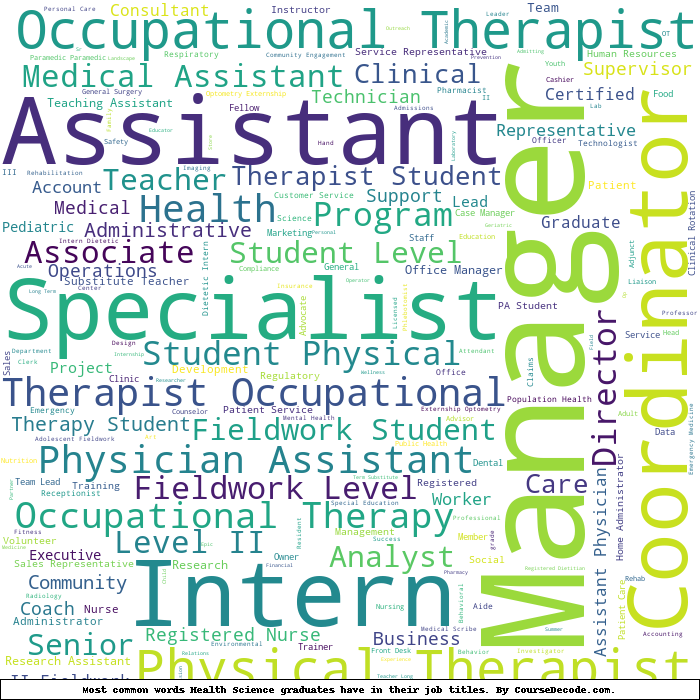
First, some facts. Of the Health Science graduates from Stony Brook University we've analyzed , here's how many have used (or NOT used) their degree in their career:

These are estimates based on AI analysis of 12 LinkedIn profiles (see below).
The verdict? Significantly above average. Overall, with an average relevance score of 79%, Health Science graduates from Stony Brook University have a much higher likelihood (+12%) of finding work in this field compared to the average graduate across all fields:
And for comparison, here's the chart for all profiles we've looked at across all degrees.
Also, after graduating, only 33% of these graduates have pursued further education other than another Bachelor's degree (such as a Masters degree or other), compared to the average across all profiles of 35%. This suggests a Bachelors degree is enough for most Health Science graduates, and it's normal to look for work straight after graduation.
See the details:
|
Relevance score: 89% We think this person has gone into a career highly relevant to their degree. We think this person has gone into a career highly relevant to their degree.
DEGREE INFOGraduated in 2016 from Stony Brook University with a Bachelor's degree in Health Science. No other secondary education since. JOB HISTORY SINCE GRADUATIONCare Manager Advance Care Alliance Jul 2016 - Jul 2020 Community Guide Professional  Community Partnerships, Inc. Jul 2020 - Mar 2022 Intake Specialist  UNC Health Johnston May 2021 - Present SME Writer  Relias Mar 2022 - Present ABOUTNo information provided. |
The top 10 most common jobs done by the graduates we've analyzed (ranked most common to least) are:
When looking at the career paths of graduates from Stony Brook University's Health Science program, it’s clear that there's a mix of jobs that are closely tied to the field and some that don’t really relate at all. The most common roles include paramedics, registered nurses, and health-related positions like medical assistants and care managers. These jobs are highly relevant because they directly apply the health science knowledge and skills learned in their degree programs. For instance, being a paramedic or a nurse involves emergency situations or patient care where health science principles are absolutely necessary.
On the flip side, there are quite a few graduates who have ventured into roles that are pretty far removed from health science. Positions like IT analysts, software trainers, and even managers in retail or hospitality don’t leverage much of what they learned in their Health Science courses. While some of these jobs may touch on health-related topics or require a basic understanding of health systems, they mostly focus on areas outside of health science competencies. So overall, while many grads are using their degrees effectively in health-related careers, a noticeable portion has strayed into unrelated fields, which is something to think about when considering how diverse job opportunities can be even with a specialized degree.
Here is a visual representation of the most common words in job titles for Health Science graduates (this is across all Health Science graduates we've analyzed, not just those who went to Stony Brook University):

When you look at the career paths of Stony Brook University graduates in Health Science, there's definitely a mix. Right after graduation, many of these individuals land roles that are pretty pertinent to the health field. For instance, graduates have taken on positions like Paramedics, Registered Nurses, and Radiologic Technologists. It's clear that those who graduated more recently, especially around 2021 to 2023, are diving into relevant jobs fairly quickly, with roles like Medical Assistant and positions in clinical research and support. This suggests that the Health Science degree opens up some solid entry-level opportunities in the healthcare sector.
However, as we check in on those who graduated earlier, the picture starts to get a bit muddled. Some have shifted away from direct health care roles, venturing into areas like IT and management which, while respectable, might not leverage their health science education to its full extent. For example, some graduates took on jobs that were more focused on data analysis or hospitality, which don't directly relate to their field of study. Over the years, the trajectory seems to show a mix of staying within health-focused careers or branching out into other sectors, suggesting that while there are strong paths in health, not every graduate sticks to it long-term. Overall, there’s potential for a fulfilling career in health sciences, but the journey might look different for each individual.
Getting a Bachelor’s degree in Health Science at Stony Brook University is pretty challenging, but it’s not impossible! Like most health science programs, you’ll encounter a mix of tough coursework, including biology, chemistry, and public health topics, along with some hands-on experiences. The workload can be heavy at times, especially if you're balancing lab work with other classes, but if you’re passionate about the subject and willing to put in the effort, you'll manage. It’s definitely on the tougher side compared to some other majors, but a lot of students find it super rewarding if they stick with it. Just be ready to study hard and seek help when you need it!
Most commonly, in the LinkedIn profiles we've looked at, it takes people 4 years to finish a Bachelor degree in Health Science.
Looking at the job histories of these Stony Brook University Health Science graduates, it seems like they're finding some decent opportunities, but the earnings might be all over the place depending on the role and field. For instance, the ones who went into nursing or more specialized healthcare positions like radiologic technologists will likely make more, especially since nursing can lead to good pay relatively quickly. Others, like those who ventured into IT or environmental health, might have a mixed bag of salaries depending on their experience and the sector they’re in. While many seem to be on a good trajectory, especially with promotions like the IT Manager role and managerial positions in hospitality, there are also a few entry-level jobs that might not be paying as much. Overall, they’re doing well and seem to be growing in their careers, but there’s room for improvement in some cases!
Here is a visual representation of the most common words seen in the "about" section of LinkedIn profiles who have a Bachelor degree in Health Science (this is across all Health Science graduates we've analyzed, not just those who went to Stony Brook University). This may or may not be useful:

Here are all colleges offering a Bachelor degree in Health Science (ordered by the average relevance score of their Health Science graduates, best to worst) where we have analyzed at least 10 of their graduates:
| College | Score | Count |
|---|---|---|
 Northeastern University Northeastern University
|
86 | 15 |
 Stony Brook University Stony Brook University
|
79 | 12 |
 Boston University Boston University
|
74 | 13 |
 Stockton University Stockton University
|
68 | 10 |